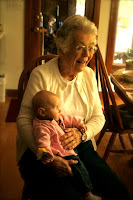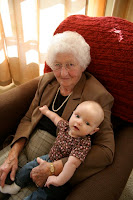- Cleaned master bedroom closets
- Cleaned off night stands, dressers and desk
- Replaced one sink
- Re-caulked one sink
- Replaced hardware on both sinks (in progress)
- Replaced light fixture in downstairs bathroom
- Did laundry
- Went grocery shopping (sort of)
- Flushed Jeep radiator and changed fluid
- Took a load to Goodwill
Sunday, January 31, 2010
I need a weekend to recover from my weekend
Monday, January 18, 2010
Belated Post: Our Anniversary Celebration



Sunday, January 17, 2010
Godspeed, Mutiso!
Saturday, January 9, 2010
Big Day


The downstairs window is old and the upstairs window is new. Much better, don't you think? (We replaced the slider back in 2006 after it had a little run-in with a rock thrown by the weed eater.)
And...drumroll please...
Lorien got her first taste of rice cereal today. As we expected, not much actually made it into her belly, but it was a great photo-op.





Friday, January 8, 2010
How Not to Talk to Your Kids
I mentioned before that one reason I wanted to start this blog is that I really need an outlet for processing what I'm reading/thinking/discussing with friends and students, etc. I also know that that kind of post takes more time and effort than a baby update, so I'm really going to have to discipline myself to sit down and write them. I have 3 in the queue already that I would like to write, but realistically, only one of those is going to happen tonight. Here goes..
One of my former students recently shared an interesting article titled "How Not to Talk to Your Kids: The Inverse Power of Praise" written by Po Bronson in New York Magazine. Bronson basically says that indiscriminately praising kids to make them feel good about themselves actually backfires more often than it succeeds. I don't agree with all of her conclusions (or, more precisely, her applications), but I do like her discussion of the research on the topic. And don't worry—the article's not preachy. In fact, Bronson herself bristled at the idea at first, and her article reads like a ideological travelogue: She walks her readers through her own learning process. The thing's about 4000 words long, but it's worth the read.
My thoughts, not organized in any kind of linear fashion:
- Huge point: though the studies discussed in this article suggest that vague, perpetual and insincere praise can actually be damaging to kids, Bronson doesn't say that parents should stop praising their kids. (Whew!) Rather, kids need sincere, specific praise for actions they have control over. In other words, telling a kid "you're really smart" may not be helpful (you'll have to read the article to find out why, because I can't do it justice in a bullet point), but saying, "You worked really hard at that logic puzzle" is very encouraging and helpful because the kid knows what he or she did right, and it's something that can be repeated if the kid wants to.
- Contrary to self-esteem movement ideology, kids can smell a phony from a mile away. I was fascinated by the assertion that
...by the age of 12, children believe that earning praise from a teacher is not a sign you did well—it’s actually a sign you lack ability and the teacher thinks you need extra encouragement. And teens, Meyer found, discounted praise to such an extent that they believed it’s a teacher’s criticism—not praise at all— that really conveys a positive belief in a student’s aptitude.
In the opinion of cognitive scientist Daniel T. Willingham, a teacher who praises a child may be unwittingly sending the message that the student reached the limit of his innate ability, while a teacher who criticizes a pupil conveys the message that he can improve his performance even further. [bottom of p. 3 of the article]
This is not a new idea. Proverbs 27:6 lets us know that honest criticism communicated in a loving way is much better than insincere compliments.
- Kids already know they're not perfect. They just need help responding well to their own imperfections. Bronson seems to be saying that a kid who is always told, "You're great. You're great. You're great" will learn to put up a front of perfection. Reading between the lines here: I think this is because the child has an innate sense of his or her own fallibility. When the adults in his or her world pretend like the child has no weaknesses, the kid thinks, "Gosh, I need to keep up this ruse," and you end up with kids who are scared to death to show any weakness in public. How much healthier for adults to acknowledge weakness and failure like they're normal parts of life (they are!) and help the child 1) humbly accept his or her weaknesses and 2) improve in those areas.
- I love the author’s closing thought that the brain is like a muscle that becomes stronger when it gets to think about hard things. And I love the thought of teaching that to kids.
Needless to say, these concepts fascinate me both as an educator and as a parent. Leave a comment and let me know what you think.
Wednesday, January 6, 2010
Like Mother, Like Daughter?
Sunday, January 3, 2010
Anniversary Brunch Fail
A couple of weeks ago, a friend at church asked how things were going with a new baby in the house. He framed the question a bit differently than most people do: "Do you still feel married?" Good question, Joe. (He's got three little ones, so he knows how it is.) The good news is, yes, we still feel married. But we also understand that we will need to get a little more couple time back in our schedule in the near future. Thankfully, we have no lack of folks who have volunteered to hang out with Lorien once we reinstate date night. Now we just need to take them up on their offers.
This year, it was my turn to make plans for the anniversary celebration. (Side note: our first year of marriage, a friend shared that she and her husband would trade off planning their anniversary and Valentine's Day each year. We adopted that plan too and it works quite well.
 That way, we both get to be creative, and we both get to be surprised each year.)
That way, we both get to be creative, and we both get to be surprised each year.)So here we are at the Broadmoor. We stayed here on our wedding night, so it's a fun part of the anniversary story.

Friday, January 1, 2010
2009 Recap












